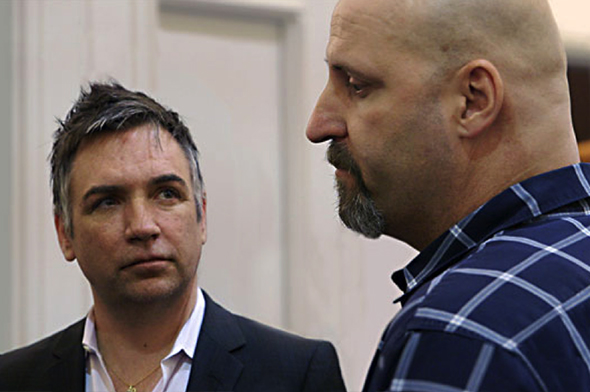
Every year around Oscar season, different folks clamor to get their hands on those films that have been nominated. Oscar-watching parties abound, instant-streaming services tax bandwidth, and workplace conversations include thoughts about that year’s contenders for cinema’s most coveted honor. Many go as far as to seek out films in the animation or foreign categories. The films in the short film categories, however, seem to be the least sought out of the bunch, and that is unfortunate considering all that the short form has to offer.
Documentaries, in particular, tend to benefit from the shorter running time, offering a look at a variety of topics without letting overblown productions or excessive length dilute their messages. This year’s Oscar-Nominated Short Films 2014: Documentary contain some solid titles that exemplify that quality. Here are a few to look out for:
Cavedigger offers a peek into the eccentric life of artist Ra Paulette, whose canvas of choice happens to be huge mountains of sandstone that he spends years carving into splendid meticulous caves. His peculiar line of work provides little in the way of financial gain while demanding incredible amounts of time and labor. The documentary gives voices to Paulette, a few people who have commissioned him to build a cave, and some of Paulette’s friends and family. It is the relationships with the latter that drive some of the conflict in this story.
The Lady in Number 6: Music Saved My Life has been called the Academy’s obligatory Holocaust story, which is somewhat offensive to begin with, but it is also rather inaccurate. Unlike the grim tone that such subject matter usually conjures, this documentary is bursting with optimism and positivity as the world is seen through the eyes of 109-year-old (at the time of filming) Alice Sommer-Herz. The tragedy of what happened in Europe in the ’30s and ’40s, while a big part, is not the center of her life. That honor belongs to the music she loves and the family she has seen the world change with.
Facing Fear is memorable mostly for the unlikeliness of its situation, as well as the unlikeliness of what happens thereafter. Matthew Boger works at the Museum of Tolerance, where he meets a guest speaker at the museum — a former neo-Nazi skinhead named Tim Zaal who speaks about his reformation. Miraculously, they realize they have met decades in the past — when Zaal and 14 other neo-Nazis beat Boger nearly to death for being gay. What follows is a story of redemption, unbelievable forgiveness, and an unlikely lifelong friendship.
Karama Has No Walls goes to the root of documentary. It is a no-frills document of the violent attack on peaceful demonstrators during a protest on March 18th, 2001 in Yemen’s Change Square. It begins almost like a news broadcast and generally maintains that tone. Very little is done to attempt to manipulate the emotions of the viewer — the actions on screen speak for themselves. It isn’t until the documentary is at a conclusion that music is noticeably used at all. Honest chills are felt when, after snipers begin firing on the unarmed crowd, nearby people can be heard shouting to the crew, “Cameraman, they are targeting you!â€
You have the chance to see the Oscar-nominated short documentaries on the big screen at the Ken Cinema starting Friday, February 28.
Obviously, sorry.
“Facing Fear is memorable mostly for the unlikeliness of its situation, as well as the unlikeliness of what happens thereafter.”
Can we say contrived??? Well, most movie narratives are contrived–one can cite many examples, but some are obviuosly more contrived than others. I mean if that’s all a movie has going for it . . .
Can’t disagree, my friend, that is pretty much what that particular short has going for it. The audience is expected to be drawn to the notion of forgiveness above all else. Yes, contrived is an apt description.